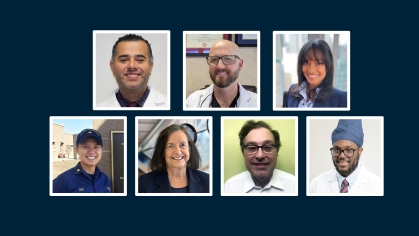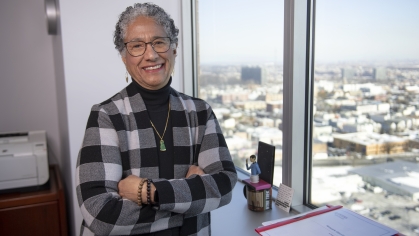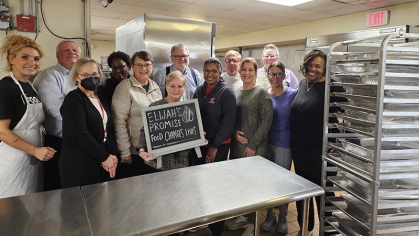A Decade of Discovery
All Rutgers Health units engage in breakthrough research and conduct transformative projects. Here are a few highlights.
The late infantile form of Batten Disease is a rare but devastating genetic disorder: Patients typically become symptomatic between the ages of 2 and 4 and rarely survive their 12th birthday.
While antiepileptic drugs and several forms of therapy relieve some of the symptoms, no treatment extended life until Peter Lobel and David Sleat – researchers with appointments at both Robert Wood Johnson Medical School and the Rutgers Center for Advanced Biotechnology and Medicine – began studying the disease.
Lobel and Sleat discovered the disease’s genetic cause and partnered with a biopharmaceutical company, BioMarin, to develop an effective treatment: cranial injections of the protein the faulty genes couldn’t make. That medication, Brineura, was approved by the Food and Drug Administration (FDA) in 2017.
Their efforts transformed a death sentence into a treatable condition.
“It will be decades before we know if treated children live normal lifespans, but current signs are positive,” said Lobel, who noted that Tay-Sachs and several other genetic conditions affect the same cellular waste-clearing function and might respond to similar treatments. “Disease progression appears to stop when treatment begins… It’s the sort of discovery everyone dreams of making.”
Brineura’s creation was one of hundreds of breakthroughs to emerge from Rutgers Health in its first decade of operations.
Supporters of the merger that created Rutgers Health argued that the resulting organization would have the scale needed to make truly life-altering discoveries. Time has proven them right.
Discoveries with similarly life-changing potential emerged from many other labs at the school’s campuses in Newark and New Brunswick.
“Rutgers Health is a research powerhouse by any measurement,” said Rutgers Biomedical and Health Sciences Chancellor Brian Strom, who leads Rutgers Health. “Its faculty are now generating more than $400 million per year in research grants and sponsored programs. In aggregate, RBHS has brought into Rutgers more than $3.7 billion in awarded funding over its ten years of existence. However, more importantly, our faculty discoveries are improving nearly every aspect of human health, not only for the patients they treat directly but for patients all around the world who benefit from their breakthroughs. Our role in the Covid-19 pandemic was another example. We are extremely proud of the many contributions of our faculty, staff, and students.”
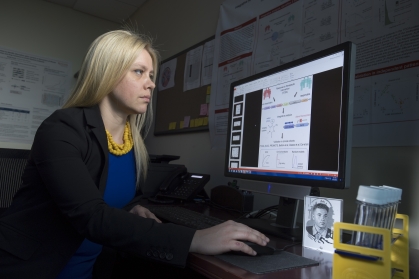
Antonina Mitrofanova, an associate professor at the Rutgers School of Health Professions and research member of the Rutgers Cancer Institute of New Jersey, developed an algorithm that predicts how prostate cancer patients will respond to initial treatment with androgen deprivation therapy (ADT).
ADT has long been the standard treatment for the second most common cancer behind breast cancer, but it only works in half of all patients and actually speeds cancer progression in many others. Mitrofanova’s computerized solution predicts response by looking at genetic and nongenetic information from each patient’s initial biopsy.
“When the patient is diagnosed with prostate cancer, part of the biopsy is put aside and screened for these markers,” she said. “From there, we can determine which patients will respond favorably and which will be at risk to inform both the patient and physician if this will be the best treatment for that patient.”
Initial trials showed the software correctly predicted ADT outcomes 90 percent of the time. Since then, Mitrofanova and her colleagues have created a new algorithm that predicts the efficacy of second-line prostate cancer treatments that patients receive after initial treatment stops working.
Mitrofanova’s team wasn’t the only group at Rutgers Health to make breakthrough discoveries in treating cancer. A study of individuals living with HIV showed that treatment of a precancerous condition known as HSIL (high-grade squamous intraepithelial lesions) cuts the risk of developing anal cancer by more than half.
The phase 3 trial accrued 10,723 participants from 25 sites throughout the United States, including the Department of Obstetrics and Gynecology at Rutgers New Jersey Medical School (NJMS) in Newark. Half of the 4,459 participants with HSILs underwent immediate treatment, while the rest received the current standard of care, active monitoring, but no treatment. After a median follow-up of slightly more than two years, 21 of the untreated patients but nine treated patients developed anal cancer.
“We know the Pap test, which tests for abnormal cells in the cervix, has greatly reduced cervical cancer rates in recent years,” said Mark Einstein, associate dean of clinical research as well as professor and chair of the Department of Obstetrics, Gynecology, and Reproductive Health at NJMS. “We wanted to show that this type of routine screening, combined with treatment of precancerous cells in the anal canal, is also effective for those with HSIL.”
Einstein, a co-author of the study, added: “Results from this study showing this testing and treatment strategy is effective to provide the evidence needed for the development of much-needed guidelines for anal cancer screening and the recommendation that such screening should be routine for individuals living with HIV.”
Breakthrough treatments only work when patients receive timely care, which is why Rutgers Cancer Institute of New Jersey launched a massive ongoing collaboration called ScreenNJ with the New Jersey Department of Health and many other community partners throughout the state.
ScreenNJ seeks the most efficient and effective ways to maximize timely cancer screenings for breast cancer, cervical cancer, colorectal cancer, lung cancer, prostate cancer and skin cancer, as well as cancers related to family and personal genetic risk factors.
As Rutgers Health celebrated its 10th anniversary, ScreenNJ partners and staff have:
- Facilitated more than 83,000 cancer screenings and found more than 4,800 cancers and other significant findings
- Educated more than 21,000 healthcare professionals and 111,000 members of the public about cancer screening guidelines and how to access care
- Placed cancer prevention and screening navigators in settings with a focus on serving uninsured patients, Medicaid patients, patients with limited connection to primary care and prevention services, veterans and other underserved subpopulations
- Coordinated patient referral and cancer prevention and screening healthcare delivery workflows with many clinical and public health practice sites to increase patient access to and utilization of cancer prevention and screening-focused resources statewide
Reducing cancer rates – along with all the other harms associated with nicotine and tobacco – is also the main goal of another Rutgers Health unit that has produced breakthrough research over the past decade, the Rutgers Institute for Nicotine and Tobacco Studies.
In 2018, the institute’s efforts to monitor how tobacco makers work to attract and hook new users attracted a five-year $18 million grant that was shared with the University of Pennsylvania’s Pearlman School of Medicine and used to examine the effects of tobacco marketing on public health. The grant-funded research produced dozens of published papers on tobacco industry marketing practices, including a number on how tobacco companies market menthol-flavored tobacco specifically to Black communities.
Several of these studies were submitted to the FDA in support of proposed regulation that will outlaw menthol-flavored tobacco products.
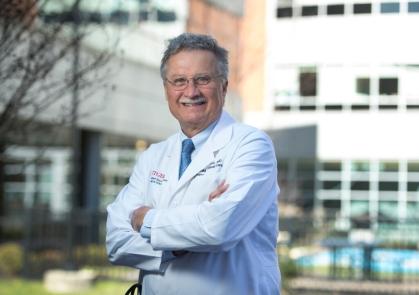
An even larger grant – $29 million from the National Institutes of Health in support of efforts to speed new discoveries from the laboratory to the doctor’s office – went to the Rutgers Institute for Translational Medicine and Science, which includes Princeton University and the New Jersey Institute of Technology. This grant money has allowed Rutgers and its partners to train and cultivate the translational science workforce; engage patients and communities in every phase of the translational process: promote the integration of special and underserved populations in translational research across the human lifespan; innovate processes to increase the quality and efficiency of translational research, particularly of multisite trials; and advance the use of big data information systems.
“The ultimate goal is bringing more evidence-based treatments to more patients more quickly,” said Reynold Panettieri, vice chancellor for translational medicine and science and director of Rutgers Institute for Translational Medicine and Science.
As many Rutgers researchers worked to cure diseases, others worked to prevent people from contracting them in the first place.
A team led by Henry Raymond, an associate professor at the Rutgers School of Public Health, devised a plan to end the HIV epidemic in New Jersey by 2025. The plan, which officials from Rutgers, the state and other organizations are working to enact, aims to:
- Reduce the number of new HIV infections by 75 percent
- Promote access to testing so all people living with HIV/AIDS know their status
- Bolster access to care so at least 90 percent of all people with the virus are virally suppressed
At the Rutgers School of Dental Medicine, researchers have sought ways to control patient pain while limiting the use of opioid medication.
Sharply rising numbers of fatal opioid overdoses – which killed more than 80,000 Americans in 2021 – have spurred the entire healthcare industry to seek alternative painkillers. The urgency has been particularly great among dentists, who have historically ranked among the top opioid prescribers. Rutgers has led the way.
As a precursor to the Opioid Analgesic Reduction Study, researchers led by the school's Dean Cecile A. Feldman conducted a pilot study that prescribed post-operative pain medication to 50 patients who underwent third molar extraction surgery to begin to test the effectiveness of opioid versus non-opioid pain medication over the post-operative period. Treatment with the over-the-counter combination of acetaminophen and ibuprofen pain medications proved more effective than treatment with the hydrocodone-containing opioid.
It was a practice-changing finding, one that could eliminate thousands of opioid prescriptions each year and thus reduce the chance of prescription medication creating addicts or being sold to existing ones. This study paved the way for a $11.7 million grant from the National Institutes of Health, with which the team has been researching the combination of ibuprofen and acetaminophen as an alternative to opioids.
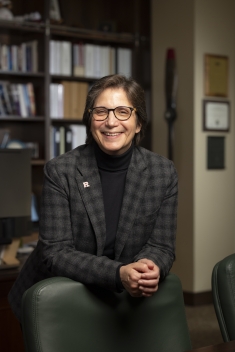
Another dental school study tested the nonaddictive marijuana derivative cannabidiol (CBD) as a treatment for patients whose tooth pain doesn’t respond to the ibuprofen-acetaminophen combination. Once again, the opioid alternative performed well. About 85 percent of CBD users reported at least a 50 percent reduction in their initial pain, and both CBD groups reached a median 70 percent reduction in pain.
“A larger phase 3 trial will be the next step to get FDA approval for pure CBD solutions to use for dental pain management,” said Vanessa Chrepa, lead author of the study who is an associate professor at the Rutgers School of Dental Medicine and director of clinical and translational research at the school’s department of endodontics. “That said, the results of this study are strong enough to make a compelling case to use pure CBD for dental pain."
Looking forward, major investments in research facilities will lay the groundwork for further discoveries.
As Rutgers Health celebrated its 10th anniversary, construction was just beginning on the Rutgers Health Building at the Health & Life Science Exchange (HELIX). The downtown New Brunswick complex will house Robert Wood Johnson Medical School and a Rutgers translational research facility. The structure’s labs will support 80 research teams working on health innovations to improve individual and public health.
Rutgers plans to invest $572 million in the project, and Rutgers Health leadership hopes to spend another $600 million on transformational renovation and reconstruction at Rutgers New Jersey Medical School.
“Improvements at the 47-year-old Medical Sciences Building — the central hub of the NJMS campus — would create world-class laboratories with greatly increased capacity. Such upgrades should help existing faculty attract more research funding while allowing the medical school to bring in more top talent,” Dean Robert Johnson said.
Rutgers Health is also beginning to leverage a major investment in artificial intelligence that its leaders hope will systematically speed new discoveries in the lab and their spread to standard medical practice.
“The Artificial Intelligence Center of Excellence that we’ve co-created with RWJBarnabas Health is now receiving all the clinical data that we generate through our electronic health records when treating patients and is inputted into our Clinical and Research Data Warehouse,” said Senior Vice Chancellor for Clinical Affairs Vicente Gracias. “Researchers now have easy access to all that data – which is basically all the health data for more than 5 million New Jersey residents – to test hypotheses and generate discoveries. The AI will also analyze that data and generate algorithms for researchers to test. Once research validates an idea, we have created links to businesses that speed the commercialization of our discoveries.”
Gracias added: “There are very few systems globally with anything like the capacity we’ve built, and we expect it to turbocharge our pace of discovery going forward.”
RBHS 10th Anniversary
In 10 years, Rutgers Biomedical and Health Sciences (RBHS) has seen transformational achievements that have catalyzed us, changed Rutgers, and benefitted New Jersey and our valued partners and communities. Throughout this year, we're celebrating our impact and telling our story.

